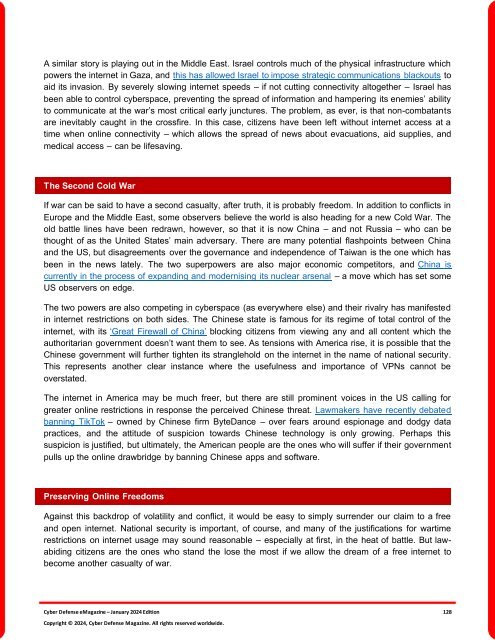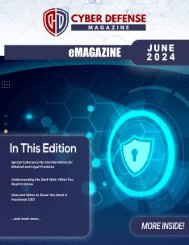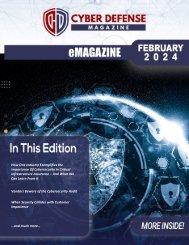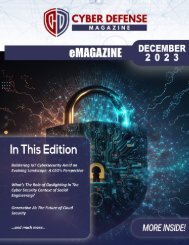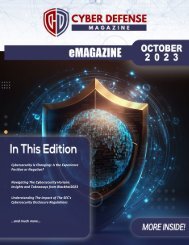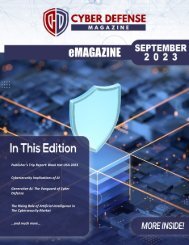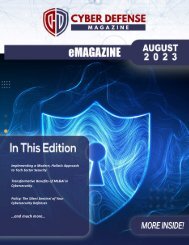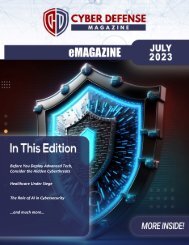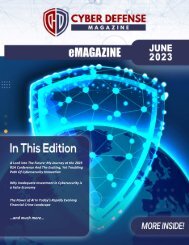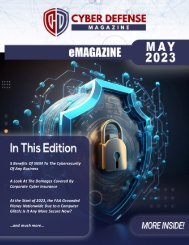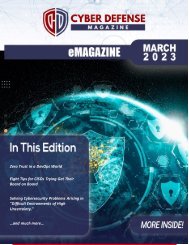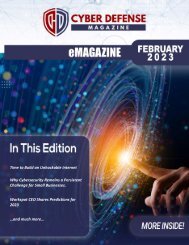The Cyber Defense eMagazine January Edition for 2024
Cyber Defense eMagazine January Edition for 2024 #CDM #CYBERDEFENSEMAG @CyberDefenseMag by @Miliefsky a world-renowned cyber security expert and the Publisher of Cyber Defense Magazine as part of the Cyber Defense Media Group as well as Yan Ross, Editor-in-Chief and many more writers, partners and supporters who make this an awesome publication! 201 page January Edition fully packed with some of our best content. Thank you all and to our readers! OSINT ROCKS! #CDM #CDMG #OSINT #CYBERSECURITY #INFOSEC #BEST #PRACTICES #TIPS #TECHNIQUES
Cyber Defense eMagazine January Edition for 2024 #CDM #CYBERDEFENSEMAG @CyberDefenseMag by @Miliefsky a world-renowned cyber security expert and the Publisher of Cyber Defense Magazine as part of the Cyber Defense Media Group as well as Yan Ross, Editor-in-Chief and many more writers, partners and supporters who make this an awesome publication! 201 page January Edition fully packed with some of our best content. Thank you all and to our readers! OSINT ROCKS! #CDM #CDMG #OSINT #CYBERSECURITY #INFOSEC #BEST #PRACTICES #TIPS #TECHNIQUES
You also want an ePaper? Increase the reach of your titles
YUMPU automatically turns print PDFs into web optimized ePapers that Google loves.
A similar story is playing out in the Middle East. Israel controls much of the physical infrastructure which<br />
powers the internet in Gaza, and this has allowed Israel to impose strategic communications blackouts to<br />
aid its invasion. By severely slowing internet speeds – if not cutting connectivity altogether – Israel has<br />
been able to control cyberspace, preventing the spread of in<strong>for</strong>mation and hampering its enemies’ ability<br />
to communicate at the war’s most critical early junctures. <strong>The</strong> problem, as ever, is that non-combatants<br />
are inevitably caught in the crossfire. In this case, citizens have been left without internet access at a<br />
time when online connectivity – which allows the spread of news about evacuations, aid supplies, and<br />
medical access – can be lifesaving.<br />
<strong>The</strong> Second Cold War<br />
If war can be said to have a second casualty, after truth, it is probably freedom. In addition to conflicts in<br />
Europe and the Middle East, some observers believe the world is also heading <strong>for</strong> a new Cold War. <strong>The</strong><br />
old battle lines have been redrawn, however, so that it is now China – and not Russia – who can be<br />
thought of as the United States’ main adversary. <strong>The</strong>re are many potential flashpoints between China<br />
and the US, but disagreements over the governance and independence of Taiwan is the one which has<br />
been in the news lately. <strong>The</strong> two superpowers are also major economic competitors, and China is<br />
currently in the process of expanding and modernising its nuclear arsenal – a move which has set some<br />
US observers on edge.<br />
<strong>The</strong> two powers are also competing in cyberspace (as everywhere else) and their rivalry has manifested<br />
in internet restrictions on both sides. <strong>The</strong> Chinese state is famous <strong>for</strong> its regime of total control of the<br />
internet, with its ‘Great Firewall of China’ blocking citizens from viewing any and all content which the<br />
authoritarian government doesn’t want them to see. As tensions with America rise, it is possible that the<br />
Chinese government will further tighten its stranglehold on the internet in the name of national security.<br />
This represents another clear instance where the usefulness and importance of VPNs cannot be<br />
overstated.<br />
<strong>The</strong> internet in America may be much freer, but there are still prominent voices in the US calling <strong>for</strong><br />
greater online restrictions in response the perceived Chinese threat. Lawmakers have recently debated<br />
banning TikTok – owned by Chinese firm ByteDance – over fears around espionage and dodgy data<br />
practices, and the attitude of suspicion towards Chinese technology is only growing. Perhaps this<br />
suspicion is justified, but ultimately, the American people are the ones who will suffer if their government<br />
pulls up the online drawbridge by banning Chinese apps and software.<br />
Preserving Online Freedoms<br />
Against this backdrop of volatility and conflict, it would be easy to simply surrender our claim to a free<br />
and open internet. National security is important, of course, and many of the justifications <strong>for</strong> wartime<br />
restrictions on internet usage may sound reasonable – especially at first, in the heat of battle. But lawabiding<br />
citizens are the ones who stand the lose the most if we allow the dream of a free internet to<br />
become another casualty of war.<br />
<strong>Cyber</strong> <strong>Defense</strong> <strong>eMagazine</strong> – <strong>January</strong> <strong>2024</strong> <strong>Edition</strong> 128<br />
Copyright © <strong>2024</strong>, <strong>Cyber</strong> <strong>Defense</strong> Magazine. All rights reserved worldwide.


